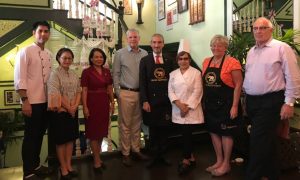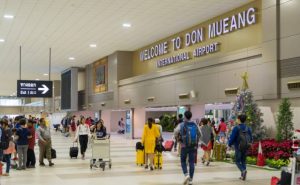Geneva (Switzerland) – March 5, 2020 (travelindex.com) – On 30 January 2020, the Director-General of the World Health Organization, following the advice of the Emergency Committee convened under the International Health Regulations (2005), declared the current outbreak of COVID-19 a public health emergency of international concern and issued Temporary Recommendations. The Committee asked the Director-General to provide further advice on these matters and, if necessary, to make new case-by-case recommendations, in view of this rapidly evolving situation.
Affected areas
“Affected areas” are considered those countries, provinces, territories or cities experiencing ongoing transmission of COVID-19, in contrast to areas reporting only imported cases. As of 27 February 2020, although China, particularly the Province of Hubei, has experienced sustained local transmission and has reported by far the largest number of confirmed cases since the beginning of the outbreak, lately the situation in China showed a significant decrease in cases. At the same time, an increasing number of countries, other than China, have reported cases, including through local transmission of COVID-19. As the epidemic evolves, it will be expected that many areas may detect imported cases and local transmission of COVID-19. WHO is publishing daily situation reports on the evolution of the outbreak.
The outbreaks reported so far have occurred primarily within clusters of cases exposed through close-contacts, within families or special gathering events. COVID-19 is primarily transmitted through droplets from, and close contact with, infected individuals. Control measures that focus on prevention, particularly through regular hand washing and cough hygiene, and on active surveillance for the early detection and isolation of cases, the rapid identification and close monitoring of persons in contacts with cases, and the rapid access to clinical care, particularly for severe cases, are effective to contain most outbreaks of COVID-19.
Recommendations for international trafic
WHO continues to advise against the application of travel or trade restrictions to countries experiencing COVID-19 outbreaks.
In general, evidence shows that restricting the movement of people and goods during public health emergencies is ineffective in most situations and may divert resources from other interventions. Furthermore, restrictions may interrupt needed aid and technical support, may disrupt businesses, and may have negative social and economic effects on the affected countries. However, in certain circumstances, measures that restrict the movement of people may prove temporarily useful, such as in settings with few international connections and limited response capacities.
Travel measures that significantly interfere with international traffic may only be justified at the beginning of an outbreak, as they may allow countries to gain time, even if only a few days, to rapidly implement effective preparedness measures. Such restrictions must be based on a careful risk assessment, be proportionate to the public health risk, be short in duration, and be reconsidered regularly as the situation evolves.
Travel bans to affected areas or denial of entry to passengers coming from affected areas are usually not effective in preventing the importation of cases but may have a significant economic and social impact. Since WHO declaration of a public health emergency of international concern in relation to COVID-19, and as of 27 February, 38 countries have reported to WHO additional health measures that significantly interfere with international traffic in relation to travel to and from China or other countries, ranging from denial of entry of passengers, visa restrictions or quarantine for returning travellers. Several countries that denied entry of travellers or who have suspended the flights to and from China or other affected countries, are now reporting cases of COVID-19.
Temperature screening alone, at exit or entry, is not an effective way to stop international spread, since infected individuals may be in incubation period, may not express apparent symptoms early on in the course of the disease, or may dissimulate fever through the use of antipyretics; in addition, such measures require substantial investments for what may bear little benefits. It is more effective to provide prevention recommendation messages to travellers and to collect health declarations at arrival, with travellers’ contact details, to allow for a proper risk assessment and a possible contact tracing of incoming travellers.
Recommendations for international travellers
It is prudent for travellers who are sick to delay or avoid travel to affected areas, in particular for elderly travellers and people with chronic diseases or underlying health conditions.
General recommendations for personal hygiene, cough etiquette and keeping a distance of at least one metre from persons showing symptoms remain particularly important for all travellers. These include:
– Perform hand hygiene frequently, particularly after contact with respiratory secretions. Hand hygiene includes either cleaning hands with soap and water or with an alcohol-based hand rub. Alcohol-based hand rubs are preferred if hands are not visibly soiled; wash hands with soap and water when they are visibly soiled;
– Cover your nose and mouth with a flexed elbow or paper tissue when coughing or sneezing and disposing immediately of the tissue and performing hand hygiene;
– Refrain from touching mouth and nose;
– A medical mask is not required if exhibiting no symptoms, as there is no evidence that wearing a mask – of any type – protects non-sick persons. However, in some cultures, masks may be commonly worn. If masks are to be worn, it is critical to follow best practices on how to wear, remove and dispose of them and on hand hygiene after removal.
As for any travel, travellers are also advised to follow proper food hygiene practices, including the five keys for food safety, as well as recommendations to reduce the risk of transmission of emerging pathogens from animals to human in live markets.
Travellers returning from affected areas should self-monitor for symptoms for 14 days and follow national protocols of receiving countries. Some countries may require returning travellers to enter quarantine. If symptoms occur, such as fever, or cough or difficulty breathing, travellers are advised to contact local health care providers, preferably by phone, and inform them of their symptoms and their travel history. For travellers identified at points of entry, it is recommended to follow WHO advice for the management of travellers at points of entry. Guidance on treatment of sick passengers on board of airplanes is available on ICAO and IATA websites. Key considerations for planning of large mass gathering events are also available on WHO’s website. Operational considerations for managing COVID-19 cases on board of ships has also been published.
For countries which decide to repatriate nationals from affected areas, they should consider the following to avoid further spread of COVID-19: exit screening shortly before flight; risk communication to travellers and crew; infection control supplies for voyage; crew preparedness for possibility of sick passenger in flight; entry screening on arrival and close follow-up for 14 days after arrival.
General recommendations to all countries
Countries should intensify surveillance for unusual outbreaks of influenza-like illness and severe pneumonia and monitor carefully the evolution of COVID-19 outbreaks, reinforcing epidemiological surveillance. Countries should continue to enhance awareness through effective risk communication concerning COVID-19 to the general public, health professionals, and policy makers, and to avoid actions that promote stigma or discrimination. Countries should share with WHO all relevant information needed to assess and manage COVID-19 in a timely manner, as required by the International Health Regulations (2005).
Countries are reminded of the purpose of the International Health Regulations to prevent, protect against, control and provide a public health response to the international spread of disease in ways that are commensurate with and restricted to public health risks, and which avoid unnecessary interference with international traffic and trade. Countries implementing additional health measures which significantly interfere with international traffic are required to provide to WHO, within 48 hours of implementation, the public health rationale and relevant scientific information for the measures implemented. WHO shall share this information with other States Parties. Significant interference generally means refusal of entry or departure of international travellers, baggage, cargo, containers, conveyances, goods, and the like, or their delay, for more than 24 hours.
WHO continues to engage with its Member States, as well as with international organizations and industries, to enable implementation of travel-related health measures that are commensurate with the public health risks, are effective and are implemented in ways which avoid unnecessary restrictions of international traffic during the COVID-19 outbreak.











